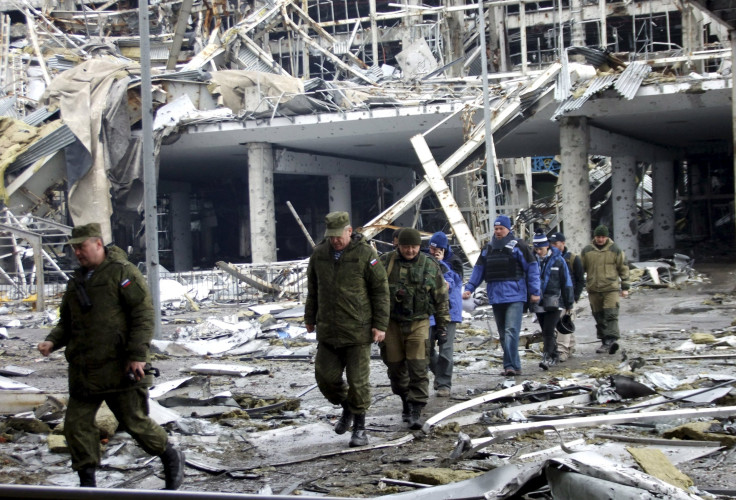Ukraine Ceasefire May Be About To Die Officially As Violations Reach Peak -- Or Moscow May Cool Off Conflict

Eastern Ukraine is still formally under a ceasefire, as it has been for the three months following the signing of the Minsk agreements in February. But almost every day since then, the Ukrainian army and the pro-Russian rebels have continued to fight, shelling and shooting at each other.
On Tuesday, six Ukrainian soldiers were killed in clashes close to the de facto rebel capital of Donetsk, matching the record for the highest single-day death toll since the ceasefire came into force Feb. 15. The use of heavy weapons has reached levels on par with what it was before the truce was signed. And with warmer weather bringing the possibility of increased fighting, observers wonder how long a ceasefire that never really took hold can realistically last.
“At some point it will be obvious and we’ll say ‘the ceasefire is done’,” said Steven Pifer, who was U.S. ambassador to Ukraine between 1998 and 2000. Still, “in a lot of places it is holding, and you don’t have the same level of intense fighting you had during the major battles around Debaltseve or the fall of Donetsk airport,” Pifer added.
Trouble For Donetsk, Mariupol
That may be about to change as rebels concentrate fire around Donetsk and the key Ukrainian port city of Mariupol, which military analysts say are the likely locations of any significant battles in the future.
A slew of independent reports from the group charged with overseeing the ceasefire, the Organization for Security and Co-operation in Europe, has consistently observed ceasefire violations there. In April, the OSCE reported more than 1,100 explosions in areas near Donetsk and hundreds of instances of artillery and mortar fire around Mariupol.
The small village of Shyrokyne, where Ukrainian forces have sustained heavy attacks, has seen some of the most brutal fighting in recent weeks. Shyrokyne is just 22 kilometers (13 miles) from Mariupol, and fighting there may herald a bigger push by rebels toward the economically important port that feeds into the Sea of Azov and the Black Sea.
The Minsk II agreement, which was signed Feb. 12 and went into full force three days later, was supposed to end fighting and see the withdrawal of heavy weapons from front lines laid out in negotiations between leaders from Germany, France, Russia and Ukraine, also known as the Normandy Four. But while the intensity of the fighting subsided in the aftermath of the agreement, there have been few days when the ceasefire has not been violated -- by either side.
On Monday, Ukraine’s Anti-Terrorist Operations Unit (the Kiev government refers to pro-Russian separatists as terrorists) said it had recorded 42 violations of the ceasefire in just 6 hours the day before, adding up to nearly 100 over a 24-hour period.
“The number of ceasefire violations over the past day was 95, which is almost at the level seen before the conclusion of the agreements in Minsk,” the unit's Facebook page said Monday. “The enemy is no longer hesitating to fire on our positions several times a day with heavy artillery and rockets, trying to provoke Anti-Terrorist Operation forces into giving the appropriate response.”
The Ceasefire's Future
But the violations are not a one-sided affair. Pro-Russian rebels have reported 55 instances of heavy fire against them in the last day, Tass, the Russian news agency, reported. Rebels contend that the Ukrainian units are responsible for breaking the ceasefire.
But Pifer said the future of the ceasefire rests with the rebels, and with their Russian backers. (Moscow has denied Western accusations that it is involved in militarily supporting the eastern Ukrainian rebels.)
“I think the Russian involvement in eastern Ukraine has been aimed at distracting and destabilizing the government in Kiev,” he said. “So one question is, Do the Russians feel they have achieved the right level of instability or do they want more before ending this?”
Observations by the OSCE and Ukrainian forces of heavy troop and tank movements by Russian-backed forces appear to suggest that Russia’s involvement in the conflict is not over. But Pifer, the former diplomat, said the bite on Russia's economy from sanctions imposed last year by the U.S. and European Union after Russia annexed Crimea from Ukraine, may push Moscow to back down.
“The Kremlin still holds out some hope that the European sanctions might not be extended in July. That gives them an incentive to sort of keep things at a lower level of tension,” he said.
German Chancellor Angela Merkel suggested in March that sanctions may be extended until the end of the year to fit the timeline of the Minsk II agreement, which set a path until the end of 2015, with constitutional reform in Ukraine and local elections in the contested regions of Luhansk and Donetsk.
© Copyright IBTimes 2024. All rights reserved.





















